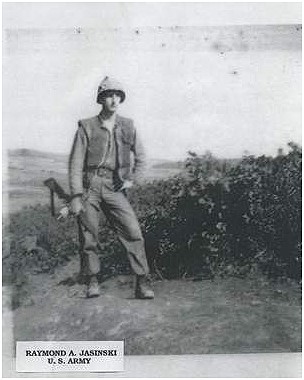Sand Bag Castle

by Raymond A. Jasinski
Korean War
Written by Ron Simon, News Journal
Reproduced with permission
It has been more than 60 years since two Army infantry companies made a lonely stand on a high ridge in North Korea called Sand Bag Castle.
For 96 days in the winter of 1952, Able and Charlie companies of the First Battalion of the 27th Infantry Regiment, 25th Infantry Division were under siege by the Red Chinese Army. Men on both sides died in droves and only the rats flourished, remembers Ray Jasinski of Company C.
Six decades hasn't dimmed Jasinski's memories of that epic stand in the freezing mountains of Korea. Jasinski, of South Home Road, calls it the worst time in his life.
Cut off from help, Jasinski said he and his buddies, most of whom died, held off wave after wave of Chinese, whose bodies lay in piles on the barbed wire where machine gun bullets cut them down.
"We couldn't bury the dead. We'd be cut down by their snipers if we tried," he said.
So the rats went to work, some of them as big as small cats, Jasinski said. Ammunition was running low. Men were down to a few biscuits. Lice were driving them half mad, and the cold was crippling them with frostbite.
"Then the bugles would blow. That meant they were coming full force again," Jasinski said. "Our machine guns fired so long they stalled up. The Chinese were coming at us with burp guns and stick grenades. One night they got into our trenches. It was hand-to-hand."
Jasinski almost sobs as he remembers that night of pure confusion and close-up killing. He stops to catch himself.
"We held!"
"We held!"
Not many survived those 96 days on Sand Bag Castle.
"I was a (private first class) when I arrived in Korea. In just six months, I was a sergeant first class. We lost so many men shot or disabled that the survivors were promoted fast."
Jasinski's maps show Sand Bag Castle was on a razor-sharp ridge, close by some other hard-fought positions called Heartbreak Ridge, Bloody Ridge and the Punch Bowl. He said Sand Bag Castle was a key position. Had the Chinese taken it, they might have forced the war to go in a different direction.
By the time help finally got through, the survivors of Able and Charlie companies were down to no food and bayonets, Jasinski said. Despite a few shrapnel wounds, Jasinski marvels how he somehow survived those 96 days.
After a brief rest and retraining in Japan, Sgt. Jasinski found himself back in Korea and back in combat. But this time he was shot in the neck by a sniper as he slipped down a trench line with a cup of hot coffee.
Jasinski has a Combat Infantry Badge. That silver rifle on a blue field is a prized possession, a recognition of a strong combat record.
A native of Mansfield who grew up on the north side, Jasinski quit St. Peter's High School in the 10th grade.
"I thought I knew everything then," he said.
After a year of working at the Westinghouse plant, the 17-year-old decided he needed a change. The Korean War had started and he joined the Army, specifying his desire to be a paratrooper. He earned his wings at Fort Benning, Ga., and got through Ranger school. He volunteered for Korea and had to go as an infantryman.
"So I was a straight-leg again," he said.
His first stop in Korea was Pusan. "Korea was a nasty, dirty place. The smell of human feces was everywhere. It was the chief source of fertilizer," he said.
The new men rode a little train north for 24 hours, switched to trucks and then walked the last few miles to Sand Bag Castle, where they replaced Turkish troops.
"The first thing we saw were two Chinese heads stuck on a bamboo pole by the Turks. That's when reality set in. It was just overwhelming," Jasinski said.
On his very first patrol, "Ski," as his mates called him, was the assistant patrol leader. He was wearing a bulletproof vest and kept his bayonet fixed on his M-1.
"We were supposed to set up an ambush, but they were waiting for us," he said.
Twelve men went out. Four came back. And then the Chinese closed in. The long siege had begun.
The endless round of combat, the tension, the cold, dysentery, the lice and even the fear of viper bite once the weather warmed could wear a man down, Jasinski said.
"The rats would come after us in our sleeping bags," he said. "I just couldn't talk about it for years until we started doing these veteran seminars at the schools.
"I'd tell the kids what happened and I'd start to get choked up. It was just a frightening experience for anyone just to get through Korea."
Jasinski had a friend, a Mansfield man, whose mind gave way under combat.
"He would go down the street talking to things and waving his arms. Sometimes he'd start to talk about it and collapse. Everyone knew he was shell-shocked," Jasinski said. "It's what killed him eventually."
Jasinski held on. Just before he left for the service, he had a date with a girl named Donna.
"She told her friend after our first date that I was the man she would marry," Jasinski said.
And so they did in 1955. They had three children, Greg, Debbie and Steve.
Jasinski earned a general equivalency diploma and took a few college-level courses in business administration. His own business was restoring and renting homes and apartments.
He didn't know it all, but he knew enough to help him survive that miserable time in Korea.
Ron Simon is a retired reporter, award-winning columnist and veteran of the U.S. Armed Forces. He can be reached at ronsimon@neo.rr.com.
